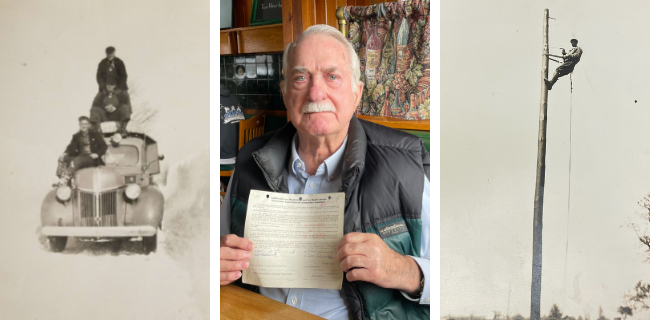Just about everything we do requires electricity. You’d be hard-pressed to find a modern convenience that doesn’t need power. We’ve become so used to flipping a switch or clicking a button for so many tasks that it’s pretty tough to imagine what life was like before that was an option.
But if you think about it, it really wasn’t that long ago when rural parts of northern Michigan turned the lights on for the first time. In fact, Richard Schmuckal, born and raised in Grand Traverse County, still remembers that day and how it changed his family’s life forever.
The year is 1941. A mother and her two young sons are making their way down Schneider Road, just about a mile east of the Hannah Church on the outskirts of Kingsley, in a hay wagon pulled by a team of borrowed mules. Richard was about 2 when his family packed up and moved to a farm they bought for $1,800, thanks to a loan from his Grandpa Schmuckal.
“There was no electricity. They had a windmill to pump water. My parents always planned to buy a better farm later,” Richard explained. Their barn burnt down in 1946, along with the entire season’s harvest. Times were tough, but with the support of the rural community, they rebuilt. Richard recalls, “In those days all the farmers would come around to help. So during the winter of 1947, they cut logs all winter and they had a barn raising in the summer of 1947.”
Still – the Schmuckal’s were without electricity. But not for long.
On November 2, 1948, Richard’s family received an approved permit to become members of the Cherryland Rural Electric Cooperative Association. The following spring, Richard vividly remembers watching the world around him change right before his eyes. “When they came by, the REA (Rural Electric Association) dug a deep hole and put a big pole in the ground. I remember thinking, ‘WOW!’ They dug all the holes by hand, and then pretty soon they started stringing the line.”
Before they could turn the lights on, the Schmuckals had to prepare. The tight-knit community of farmers once again worked together to share their talents. Richard says, “My parents had a local farmer wire the house and wire the barn. I remember them looking at catalogs and talking about what kind of light they wanted to put in the kitchen, that sort of thing.”
“I remember the first evening. They said Tuesday night they’re going to have the power on. The lights were going to be turned on, and it changed our lives forever,” he recalled. Richard was 9 years old.
This exciting new resource opened countless doors for the Schmuckal family and many others just like them. “It was a big deal getting power,” Richard explained. “One of the most important things that happened was we could get a refrigerator! Up until that time, you could buy space in a cooler in Traverse City to keep your meat cool. We could have milk coolers. We could now have an electric stove. Mother used to have to can everything in the summer with a wood-burning stove. We got indoor plumbing. Now we could take a shower or bath and get a hot water heater. Until that time, mother would have a big cooker on the stove with water because that’s how you got hot water. All those little things we take for granted.”
In addition to making life a little easier, electricity also created opportunities for Richard’s family. “Dad got a radio for the barn. So when they were milking cows, they could listen to the markets. Corn is up. Wheat is down. Cattle are up. So, how valuable is that? Invaluable,” Richard said.
From there, the Schmuckals were able to buy milking machines and grew to become one of the largest dairy farms in the area. “Once we got power and having registered Holsteins, wow, that changed everything,” he explained. They didn’t have to worry about lanterns causing devastating fires like the one that destroyed their barn just a few years earlier. They could now rely on motors to take care of much of what used to require physical labor.
“My mother always said, ‘The boys don’t stay on the farm,’” recalled Richard. “My parents were able to do well and send all six of us kids off to school.” It allowed Richard to get an education, join the military, quickly rise through the ranks, and land a well-paying job.
Just like the farmers who came together to rebuild the Schmuckals’ barn or helped wire homes so families could have electricity, Richard and his family have always held true to an important core value—“We have to serve our community and give back, because of what the community did for us.”
This is one of the values Cherryland is built upon. It’s the lifechanging foundation that brought power to many northern Michigan farmers and rural families, just like the Schmuckals.
“Electricity—there’s no way of quantifying what it meant to all of us who were without power. It changed our lives. It’s hard for me to tell you just how it changed my life,” said Richard. “Most people have no idea just how valuable it is because you just turn the light on.”



Great article Courtney! A little side bar info if I may. The first Electricity brought to the Summit City area was started in 1937 as a petition with the rural electrification act. C Clouse , R Deo and other farmers on Summit city rd. from the Manistee river north to M-113. Somehow that line was converted to Consumers Power a for profit company line. The point is the coop effort was started by the efforts of northern Michigan farmers desire to work together, to the benefit of all Michigan residents. They wished to share and prosper in the worlds greatest technology advance sense the wheel – “electricity”! Electricity distribution was a American invention by and for cooperation among all Americans. That effort was somehow lost in your very wonderful article. Coop’s are the way energy was meant to become a driving force in America. The way we produce energy; coal, hydro, gas, and nuclear, are giving way to another cooperative force in the world! Not just in America. Energy is always free and abundant. The way we go about getting that energy for use, is not yet free. It must be transferred from the forces of nature to the individual and the individuals actual point of use. This was and should be by a coop, a individual home owner or a northern Michigan farmer working with other farmers, who wish to harnesses; solar, wind, fuel cells and battery storage to form a joint cooperative effort in a much more “together” cooperative effort! Not to mention a much more consistent, nearly indestructible both in production and distribution; and a vastly more efficient cooperative way. The time for the rural electrification act to again spring forth is here and now. We like the “The Day the Lights Came On” is upon us all, NOW !!! Lets’ have a barn Raising and repeat a togetherness effort not seen for the past 100 years. thanks for reading one mans opinion.